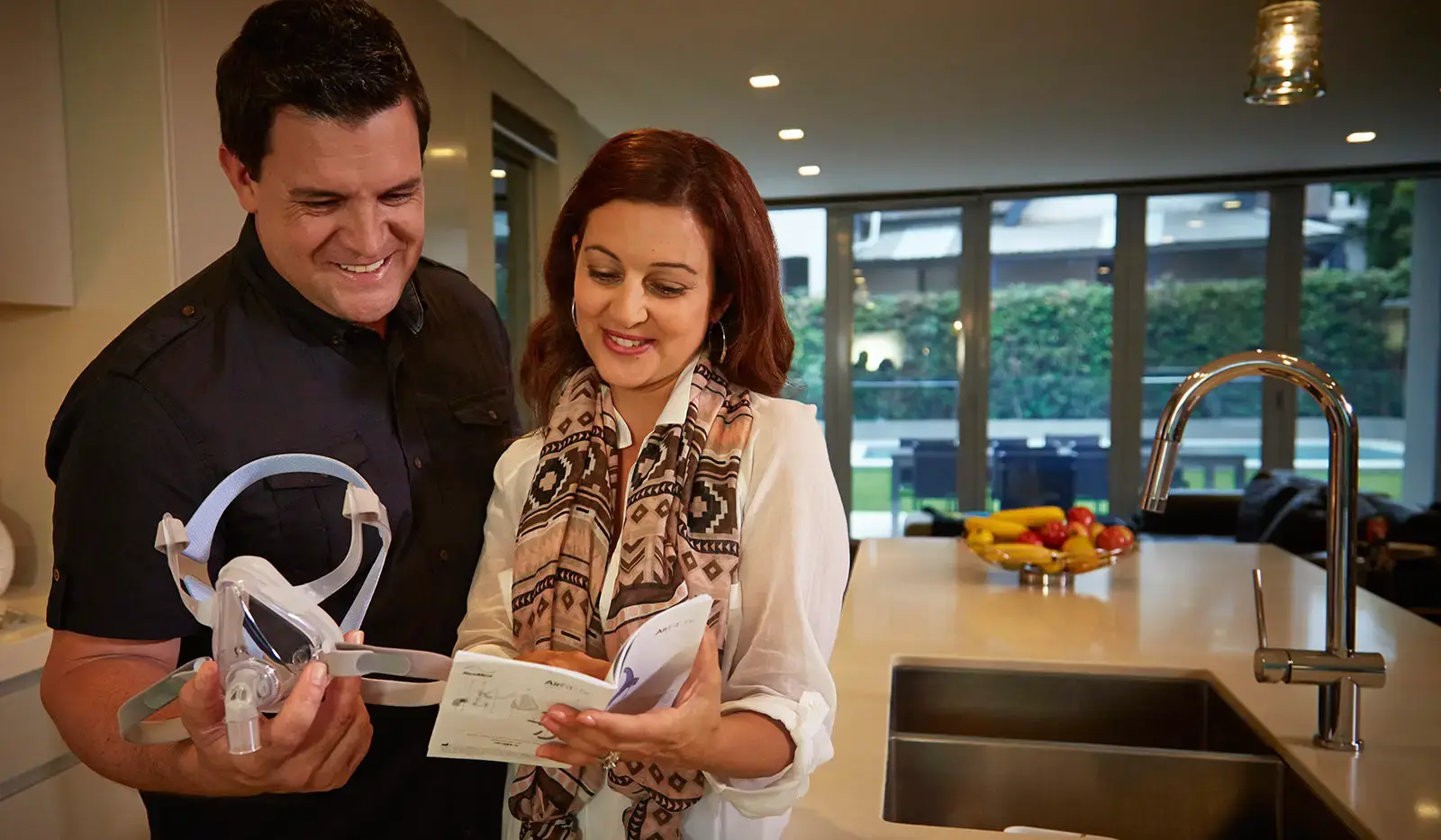With your ResMed CPAP trial, you’ll be able to start therapy at your own pace and gain an understanding of what’s going on. You’ll also be able to see what feels right before deciding which mask and device to get.
Remember, there are lots of benefits from using CPAP therapy, including reduced snoring, fewer headaches and less interrupted sleep. Among these things, you may also enjoy a more peaceful sleep experience, higher energy levels during the day and perhaps a happier bed partner too.
There are a lot of myths around CPAP therapy, but most people who try it are amazed to see how easy it is to use and how comfortable the masks are. And although there are other ways to treat sleep apnea, CPAP remains the gold standard treatment.
So how does CPAP work exactly? It involves a device delivering a gentle flow of air via a mask into your airways. The positive air pressure created inside your airways stops them from collapsing, so you can breathe freely and sleep without waking up.
Give yourself as much time as you need to get comfortable and used to using it. The key is to use it every night and to make it a habit.
Your mask is perhaps the most crucial part of your CPAP therapy system. If you have ordered your CPAP Trial from ResMed, we’ll have included a couple of our best masks for you to try out. Start by using the mask we’ve indicated to try first.
Fitting steps
1. Unclip the magnets from their clips.
2. With your mask held against your face, pull the headgear over your head.
3. Reconnect the magnets to their corresponding clips on the frame.
4. Adjust the tabs on the upper headgear.
5. Adjust the tabs on the lower headgear.
6. With the device switched off, connect the device tubing to the mask elbow.
7. Connect the elbow to the mask.
Fitting steps
1. Unclip the magnets from their clips.
2. With your mask held over your nose, slide the headgear over your head.
3. Reconnect the magnets to their corresponding clips on the frame.
4. Adjust the tabs on the upper headgear.
5. Adjust the tabs on the lower headgear.
6. With the device switched off, connect the device tubing to the mask elbow.
7. Connect the elbow to the mask.
Fitting steps
1. Ensure the labelled left and right sides of the nasal pillows are aligned correctly with your left and right nostrils.
2. Hold the nasal pillows against your nostrils, and pull the headgear over your head.
3. Spread the headgear split-strap open, so that the lower part sits at the back of your head and the top part rests on your crown.
4. Reseat the nasal pillows by briefly pulling the mask away from your nose and letting them fall back into place.
6. With the device switched off, connect the device tubing to the mask tube.
1. Practise wearing your mask and starting your device before you go to bed.
2. Ease into therapy by starting at low pressure or using the device ramp function. (This should be set on automatically on your trial device)
3. Place the device on a flat surface that is lower than your bed. This will move the new and unfamiliar sound of the CPAP device below your hearing level.
4. Make small strap adjustments to your mask until it’s fitting correctly.
5. Be as relaxed as you can and sleep as you usually would.
For more tips on falling asleep with CPAP, read our blog article - 7 tips to falling asleep on CPAP

Place your device where you can see it, so you’ll remember to use it every night.
Get used to putting on your mask and how it feels by practising when you’re upright and while you’re lying down.
Practice using your device with your eyes opened and closed, breathing as you normally would.
Set up your device and fill the humidifier well before bedtime, so it’s ready and waiting for you.
.jpg)
Learn the correct fitting procedure outlined in your mask user guide to ensure a secure seal.
Familiarise yourself with your mask features so when you need to make adjustments at night in the dark, you’ll know what to do.
Use a mirror or ask someone to check if the masks cushion or pillows are correctly positioned.
Adjust your headgear straps evenly. If one side is a lot tighter than the other, the cushion could twist and crease, causing mask leak.

Don’t be afraid to ask your doctor for any advice or guidance with starting therapy.
Talk to your partner, family or close friends about your CPAP therapy to help make therapy less intimidating for you both.
Check out online resources where you can learn more and connect with other CPAP users.
Remember to stay positive. Regular therapy will improve your sleep, your relationships and quality of life.

You may sleep well on therapy right from the start – some people do. Others may take a bit longer, but if you make it a habit, it will get easier.
Some benefits of CPAP therapy will depend on regular use. Other things like reduced snoring are only treated if you’re on therapy.
Try all the tips we’ve provided above on how to start therapy comfortably. The best advice is to practice using therapy as much as you can during the day.
Having the mask too tight on your face often causes marks on your skin. Try to wear the mask with just enough tension for a stable seal.
If your nose is congested, blocked or dry, try adjusting your humidifier. Some people switch to a spare full face mask when they have a cold or allergies.
If you breathe with your mouth open, you'll need to use a full face mask. If you wear a nasal or nasal pillows mask and open your mouth, air will escape.
A poor mask seal will cause a mask leak. One quick fix to try is to reseat your mask by briefly pulling it off your face and then letting it fall back into place.
Heated air from the humidifier can cause condensation inside your mask. Try adjusting the humidifier settings or raising the temperature in your bedroom.
You should clean your mask daily. For specific instructions, refer to your mask’s user guide which you can find on our mask support page.
Most ResMed CPAP devices and masks are portable and designed to be travel-friendly. They can be used overseas and even on an aeroplane.